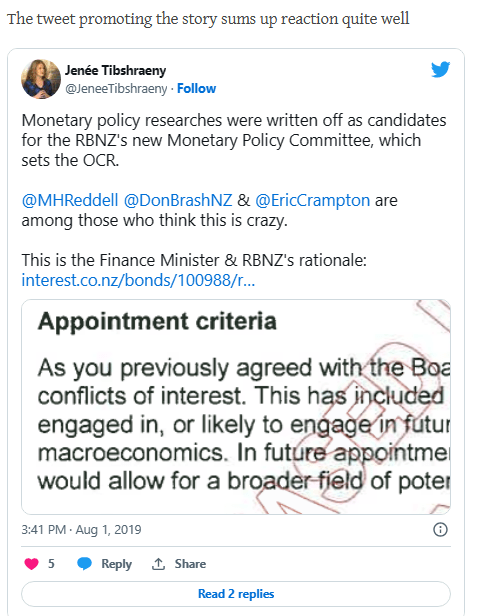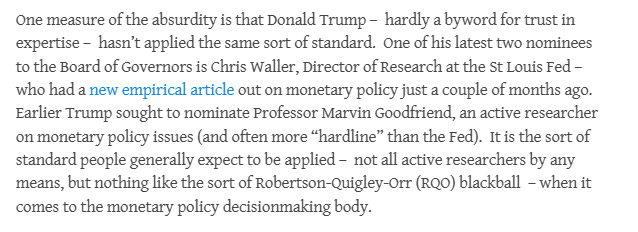On Monday the Reserve Bank Board put out a release indicating that it was opening applications to fill two external MPC vacancies (which will arise next year when the second and final terms of Peter Harris and Caroline Saunders expire). By law, the Minister of Finance can appoint to the MPC only people the Board has recommended (the Minister can reject nominees, but cannot simply impose his/her own people). There are all sorts of problems with this process and with the people involved in it, but that is for another day and another post.
When I opened Monday’s emailed release, my eye lit immediately on this

This appeared to be quite a change from the stance adopted by the Board (which includes the Governor) and the Minister of Finance since the MPC was set up under which (to quote from a January 2019 Treasury report to the Minister released to me by the Minister of Finance (page 14) in June 2019 in a response to an OIA request which had asked, inter alia, about policies designed to exclude persons or types of persons)

Anyway, it seemed like good news. I exchanged notes with a few people idly speculating on what might have changed their mind. Perhaps they (Bank, Minister) had just got sick of being mocked for being the only central bank in the world where expertise was an active disqualifying factor? Perhaps The Treasury, with a newly-strengthened oversight role in respect of the Bank, had played a part? Perhaps the new Board, deeply underqualified bunch of government mates as it was, had as fresh faces thought the old ban looked odd. Perhaps Orr and Quigley were conscious that the government might well change later in the year and that the Opposition parties already seem to look askance at various of their choices, structures, and individuals? Getting rid of the absurd ban might neutralise one more obvious irritation. We don’t know (although I have lodged an OIA request, which might – months down the track – shed a little light). It is fair to note that the very next sentence in that extract above read as follows

On Twitter, the Herald’s Jenée Tibshraeny mentioned that she was approaching Grant Robertson’s office to ask about the apparent change of stance.
Late yesterday, her story appeared. The key bits relevant to this post were a direct quote from the Minister

and a direct quote from The Treasury

(to be clear, the Bank’s sticky fingers do not appear in this story at all).
There are all manner of problems with these lines given – by powerful people and institutions – to the journalist.
For a start, why did news of the blackball emerge at all? Well, that was because an academic – who could have been well-suited to the MPC role – got in touch with me in late 2018 or early 2019 and told me that he had reached out (possibly to the Board chair himself, but I can’t now be sure of that) and been explicitly told that there was no point in applying because the Board would not be considering anyone who was an active, or likely future, researcher on macro or monetary policy matters. Since the person concerned (understandably) did not want me directly quoting him, I lodged OIA requests with the Board and the Minister of Finance to see what I could smoke out (responses written up in a post here). The Minister’s response, linked to above, revealed the policy which had apparently been agreed between the Minister and the Board. The description tallied more or less exactly with what the academic had independently told me.
The revelation of that policy agreement didn’t just die in a blog post here. Jenée Tibshraeny, then at interest.co.nz, picked it up, talked to various central bank watchers etc and wrote a story. She even talked to the Minister of Finance and to the Bank.

Her story is here. My post following it is here. Here were the lines from the Minister and the Bank

There is not the slightest suggestion there that Treasury had used ‘over-zealous language” or that the critics had got the wrong end of the stick. Rather, they are defending their stance. In fairness, you would have to say that the Minister seemed fairly half-hearted (and I have heard suggestions over the years that Quigley, the Board chair, had been the driving force behind the blackball, and that Robertson had just gone along), but he doesn’t disavow the policy or Treasury’s description of the policy.
And there, the odd jeer aside, the matter rested for a while. The new MPC was what it was, there were going to be no external vacancies for a while, and of course there was Covid.
But by late 2021 I was focused on the fact that the end of the first terms for two MPC members was approaching and started highlighting the question as to whether the blackball on expertise was still in place. Others were talking about it too, including to Tibshraeny. She had the access the rest of us didn’t and asked the Minister or his office about the policy.
As it happens, documents show they were always just planning to reappoint Buckle and Harris, so there was never a fresh search programme (or even a serious evaluation process). So they could have avoided Tibshraeny’s questioning, but instead they seem to have been quite clear (her story is here) with these two extracts


Most central bank commentators and watchers lamented (even former MoF adviser Craig Renney, quoted in the article, seemed less than convinced by the policy) but it all seemed pretty clear. The policy was what it was (recorded by Treasury) and the authors were standing by it. Had there even been any lack of clarity or misunderstanding, either the Bank or the Minister could have had their comms people make that clear. But of course, there was no misunderstanding, just a pretty clear (bad) policy.
All of which brings us back to those lines, from the Minister himself and from The Treasury, in yesterday’s Herald article. They seem utterly detached from reality, oblivious to the past paper trail. It is hard to avoid concluding that they are, and are intended as, mendacious spin. One might now have low expectations of a member of the current Cabinet, but what explains lines from The Treasury – a government department, not a political agency? I’ve lodged an OIA with Treasury to see if any useful light can be shed.
In the Herald article Robertson is also reported playing distraction with the observation that “the MPC’s three existing external members had done research”. Caroline Saunders publishes a lot of research, but she isn’t (and doesn’t pretend to be) a macroeconomist, so what she does or doesn’t publish is simply irrelevant to the blackball Robertson and the Bank had put in place. I’m not aware Peter Harris has ever published any research, and certainly not in his term on MPC, which isn’t surprising as he has never really been a research economist. Bob Buckle, a former Treasury official and retired VUW academic macroeconomist, has published papers in recent years (and perhaps MoF hoped the journalist would look up his VUW page). Papers on non-macro topics (of which there are several) are no more relevant to the blackball than they are for Saunders. There are two (largely descriptive) papers on macro topics that have been published while Buckle was on the MPC, but both were written before he took up the MPC role (one is a chapter in a book in which I also had a chapter, so I know well the painstakingly slow publication process). All of which made sense: for Buckle, the MPC role was largely a retirement job, and the quid pro quo seems to have been that he got the role and had to agree not to do future macro research, which probably wasn’t an inconvenience for him as he was retiring anyway. And in his MPC role, Buckle has not once given a speech, a paper, even an interview on New Zealand macro or monetary policy matters.
I can understand why Grant Robertson might now be embarrassed about having adopted a restriction (on expertise in central bank decisionmaking) that made him, on that score, worse than Donald Trump.

But what is staggering is Robertson descending to Trumpian standards of utter disregard for truth or the public record. And that The Treasury seems to have been aiding and abetting that descent.
But will the change lead to better quality recruits?
LikeLike
I’m not at all optimistic given a) the people on the Board, b) Adrian’s dominant position (effectively has a veto) and c) the reluctance of most capable independent people to work in an Adrian-dominated structure.
It is possible a different govt could take things in a quite different direction and towards a better structure and set of people.
LikeLike
Reblogged this on Utopia, you are standing in it!.
LikeLike
[…] Source link […]
LikeLike
Michael, you are forgetting your Orwell.
Grant Robertson was looking down at Mike speculatively. More than ever he had the air of a teacher taking pains with a wayward but promising child.
‘There is a Party slogan dealing with the control of the past,’ he said. ‘Repeat it, if you please.’
“Who controls the past controls the future: who controls the present controls the past,” repeated Michael obediently.
“Who controls the present controls the past,” said Grant, nodding his head with slow approval.
LikeLiked by 1 person
[…] Here’s what it takes to get a $50k job helping to set interest rates Michael Reddell: Mendacity Rob Stock (Stuff): Banks ‘first cab off the rank’ in Govt’s consumer data right […]
LikeLike